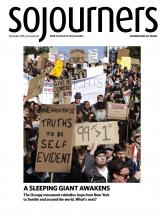When I was growing up my grandparents talked often about going through the Great Depression. I heard about Wall Street investors jumping out of windows and about the poverty most folks feared and experienced. As kids, we were reassured that we came from the kind of people who don’t give up, who go through a crisis and get closer to family and neighbor, and who possess a national pride about outlasting tough times. Gran and Pop would speak with some nostalgia about how everyone stuck together through that kind of poverty because everyone was struggling.
My parents talked often about what it was like to go through World War II. Those conversations had the same kind of “everyone pitched in” tone because everyone was equally at risk.
But the recession we are going through now doesn’t impact everyone in the same way—not everyone is struggling; not everyone is at risk. Some of us have enough financial means to be insulated from immediate threats. So what happens when a national crisis is technically a “part of the nation” crisis? Are “we” still “we”?
Almost everyone says they want to help poor people, and I think deep in their hearts, they do. It is part of our Christian heritage to “love our neighbors as we love ourselves.” It is part of our national aspiration to be the “United States.”
But in this recession we do not all face the same decisions. Those who are secure have to decide whether or not we will help those who are now out of work. This decision can’t be based mainly on our economic pain or plenty; it must be based on our principles. If “we” are still “we,” it is because we remember our faith and our common history and decide this is still the United States.
Read the Full Article
